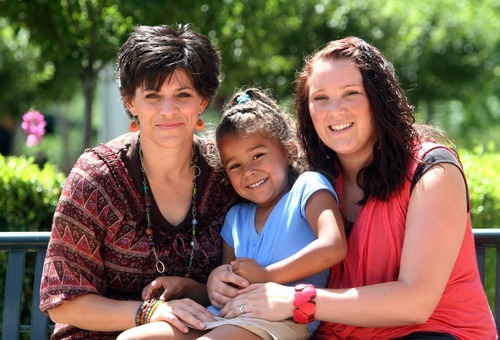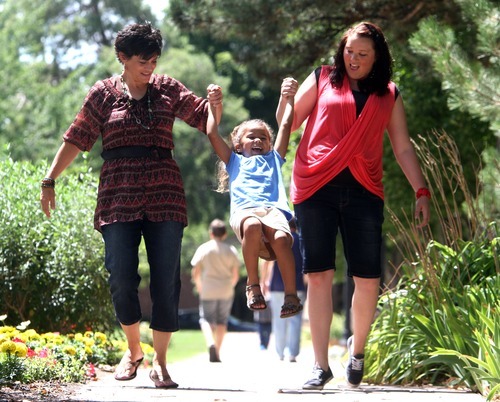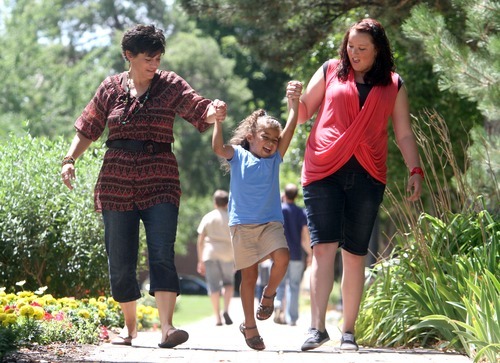This is an archived article that was published on sltrib.com in 2012, and information in the article may be outdated. It is provided only for personal research purposes and may not be reprinted.
After learning she was pregnant, Jessa Speight went from hoping her relationship with the father would work out to knowing it wouldnot and — after deciding on adoption — from expecting it to be "closed" to wanting some exchange of information with the adoptive couple who would become her daughter's parents.
But the relationship that evolved has surprised them all, moving from weekly blog updates to in-person visits — the couple even attended Speight's wedding — and regular text, Facebook and Skype exchanges.
"I never expected it to be like that," Speight said. "I expected it to be as awkward as it was the first few months of her life. I say now that seeing my birth daughter is like seeing [a] cousin. We hang out, have fun and I don't cry because I know I'm going to see them again."
There is no formal agreement governing the open relationship between Speight and her daughter's parents, and while their experience shows how such relationships can blossom, Speight knows that is unusual.
And that's why she is decidedly in favor of written, enforceable agreements that can be re-evaluated over time — which Utah's adoption law does not address and is the subject of a below-the-surface debate among adoption groups.
"It is a huge problem because some couples promise the moon and back and then they close off the relationship," said Speight, who runs the website Birthmothers4adoption. "The enforceability in the written contract forces couples to be honest about how they feel about openness. A lot of couples these days are so desperate for a child they are willing to lie and say they want an open adoption but as soon as they get the child they close it off. It's not the majority of couples, but it does happen."
—
'Greater openness' • Experts say at least 80 percent of adoptions now are open, though what that means can range from having the names of, ormeeting adoptive parents, to an ongoing relationship such as Speight has with her daughter's adoptive family. Study findings published in the National Council for Adoption's Factbook V, released in 2011, show both adoptive and birth parents are more satisfied with the adoption process when there is "greater openness," and such arrangements contribute to better adjustment of birth parents.
With wide acceptance of open adoption, the debate has now shifted to whether such agreements should be enforceable.
As of May 2011, about 26 states have statutes that specifically address open adoption arrangements that are governed by written, enforceable contracts; in some states, the law applies to all adoptions while in others it affects children of a certain age or only those in foster care. No state allows failure to comply with an agreement as grounds for setting aside an adoption decree.
Utah is nota state that addresses open adoption arrangements, and the debate here centers on the fact that, despite initial high hopes and well-intentioned promises, there are occasions when disputes arise and one side or the other wants to modify or stop the interaction.
"An example would be an adoptive couple, before the adoption, says we would like to sit down once a month and you can see the child, and a year after placement says this isn't working out so well and we're not going to have any more visits, and the birth parent comes forward and says, 'Wait a minute, you said we were going to do this,' " said David Hardy, an adoption attorney and past president of the Utah Adoption Council.
In one case he handled, adoptive parents decided to close off contact after a birth mother became involved in drugs and prostitution, Hardy said.
—
Closing off access • But there are also instances when reasons for closing off access are less clear. That happened to Gina Crotts, of Spanish Fork, who exchanged photos and letters with the adoptive parents of her daughter through the child's third birthday and then just a photograph through age 5. At that point, the adoptive parents limited information to a yearly letter with no photos, and asked Crotts to stop sending any correspondence.
"Too many times, adoptive parents desperate to adopt promise birth parents everything from annual letters and pictures to visits, and then when the adoption is finalized, they pull the rug out from underneath the bio parents for no good reason," said Wes Hutchins, an adoption attorney and president of the Utah Council for Ethical Adoption Practices. "In Utah, courts have ruled that adoptive parents can do that because after the adoption is finalized, the adoptive parents are the sole and absolute judges of what's in the best interest of the adoptee."
Speight said in the cases she's familiar with, adoptive families closed contact after a birth mom was unable to establish healthy boundaries or because of their own feelings of insecurity and frustration with infertility.
Hardy said such disputes are "fairly rare." But theyhappen often enough to prompt the discussion about whether there should be recourse when promises aren't kept or when it is no longer in a child's best interest to continue contact. The Utah Adoption Council, an advocacy group that in the past has played a strong role in shaping Utah's adoption law, has debated the issue "seriously" over the past year but not come to any consensus, Hardy said.
—
Setting the terms • Proponents say an enforcement clause allows both sides to have clarity about the type and frequency of contact and a process to follow when disagreements arise. Hutchins, also a member of the council, provided the group with proposed legislation modeled after Arizona's law. It says adoptive and birth parents may enter written agreements allowing continued communication, but gives adoptive parents the ability to terminate the contract if they believe continued contact is not in a child's best interest. A birth parent, however, could not use a dispute to undo an adoption. It also allows the court to consider wishes of children ages 12 and older.
"It has met with [some] support, but more opposition," said Hutchins. "Many are undecided."
Those who oppose post-adoption contracts say they impede the ability of adoptive families to form and safeguard their own relationship with a child, instead turning them into pseudo-guardians. It sets up a legal relationship rather than allowing a negotiated relationship to unfold. An agreement may address adoptive and birth parents' desires but leaves out the child's say. And it may create a hardship for adoptive parents who, like birth mothers, are in a vulnerable state at the time placement decisions are being made and may make promises that, for whatever reasons, they later can't or don't want to uphold.
Chuck Johnson, president of the National Council for Adoption, said that while the organization supports clear, written adoption agreements that are flexible and spell out expectations and responsibilities, it opposes making them enforceable. Once an adoption is finalized, the adoptive couple needs to be able to parent and make decisions in the best interest of their child without fear of being dragged back into court, he said.
"It's very rare for adoptive parents to renege on their promises," Johnson said. But, "when things do come up you do have to be able to say 'no,' and you don't want to be afraid of being taken into court if for some reason you upset someone as the parent."
At the same time, when adoptive parents fail to follow through "it's terrible, and I'm critical of those families who do that without justification," he added.
—
Enforcing the rules • Such arguments don't hold up to scrutiny, said Kathleen Silber, associate executive director of the Independent Adoption Center and vocal proponent of open adoption.
"We have had enforceable agreements in California for many years, and it doesn't interfere in any way with the relationship that is established," Silber said. "It is important to have structure [for] what people agree to verbally."
Laura Trinnaman, executive director of For Every Child Adoption Services and an adoptive parent, said failure of some adoptive parents to honor agreements is one of the most frustrating things an agency confronts.
"From an agency standpoint, it can make and break a country's program [and] an agency just by a few families not being willing to follow through," said Trinnaman, whose agency deals mostly with international adoption. "A huge expense of our agency is post-placement coordinating to ensure that both parties are following a schedule and getting what was agreed upon."
She favors enforceable open-adoption agreements that allow parties to use mediators when disputes or problems arise, and so do many of her clients, who say that failure to live up to agreements hurts children and birth parents and tarnishes adoption as an option.
Lindsey Redfern, who blogs about her experiences with infertility and adoption at therhouse.com, has "natural open relationships" with both of her two young sons' birth moms, which includes social media, visits and even vacationing together. She believes a written, enforceable contract would have limited how their relationships unfolded.
"This works for us because it can constantly evolve," Redfern said. "When we started out, we had no idea what we wanted. What it looks like now is not what it looked like five years ago. My fear is that if we were to have signed a contract five years ago we would have grossly missed out on a huge relationship. ... The beauty of not having it set in stone is it has been able to explode into [the birth mother being] part of our family, period."
But there is flip side, she said. "I worry that not everybody is like us," Redfern acknowledges, "and having a contract would protect a birth parent from adoptive parents who would say anything and then 'peace out.' I know birth families that have had that happen and I know adoptive families that have done that."









